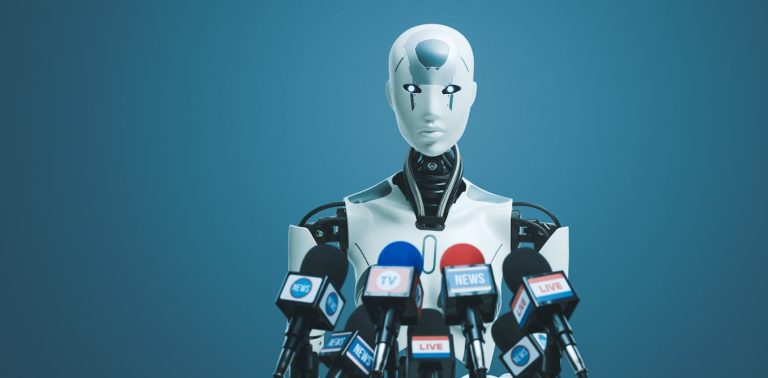From business and government to everyday life, artificial intelligence is reshaping the world – and politics could be next.
While the idea of politicians around AI may worry some people, the survey results tell a different story. A survey conducted by my university in 2021, during the early advances of AI, found broad public support for integrating AI into policy in many countries and regions.
A majority of Europeans said they would like to see at least some of their political leaders replaced by AI. Chinese respondents are even more optimistic about the definition of public policies by AI agents, while Americans, normally favorable to innovation, are more circumspect.
As a philosopher who studies the moral and political questions raised by AI, I see three main paths to integrating AI into policy, each with its own mix of promises and pitfalls.
Although some of these proposals are more outlandish than others, one thing is certain: the involvement of AI in politics will force us to consider the value of human participation in politics and the very nature of democracy.
Learn more:
Generative AI like ChatGPT could help strengthen democracy – if it overcomes key obstacles
Chatbots vying for the elections?
Before ChatGPT’s explosive arrival in 2022, efforts to replace politicians with chatbots were already well underway in several countries. From 2017, a chatbot named Alisa challenged Vladimir Putin for the Russian presidency, while a chatbot named Sam stood for election in New Zealand. Denmark and Japan have also experimented with chatbot-led policy initiatives.
These efforts, while experimental, reflect a long-standing curiosity about the role of AI in governance in various cultural contexts.
The benefit of replacing flesh-and-blood politicians with chatbots is, on some levels, quite clear. Chatbots do not present many of the problems and limitations typically associated with human politics. They are not easily tempted by the desires of money, power or fame. They don’t need rest, can interact virtually with everyone at once, and offer encyclopedic knowledge as well as superhuman analytical abilities.
However, chatbot policymakers also inherit the flaws of current AI systems. These chatbots, powered by large language models, are often black boxeslimiting our understanding of their reasoning. They frequently generate inaccurate or fabricated answers, known as hallucinations. They face cybersecurity risks, require vast IT resources, and need constant network access. They are also shaped by prejudices derived from training data, societal inequalities, and programmer assumptions.
Furthermore, political chatbots would be ill-suited to what we expect from elected officials. Our institutions were designed for human politicians, with human bodies and moral power. We expect our politicians to do more than respond to requests: we also expect them to supervise staff, negotiate with colleagues, genuinely care about their constituents, and take responsibility for their choices and actions .
Without major improvements in technology or a more radical reinvention of politics itself, chatbot politicians remain an uncertain prospect.
Direct democracy powered by AI
Another approach aims to eliminate politicians altogether, at least as we know them. Physicist Cesar Hidalgo believes that politicians are annoying middlemen that AI finally allows us to eliminate. Instead of electing politicians, Hidalgo wants every citizen to be able to program an AI agent with their own political preferences. These agents can then automatically negotiate with each other to find common ground, resolve disagreements, and write laws.
Hidalgo hopes this proposal can unleash direct democracy, giving citizens more direct input into politics while overcoming the traditional barriers of time and legislative expertise. The proposal seems particularly attractive in light of widespread dissatisfaction with conventional representative institutions.
However, eliminating representation might prove more difficult than it seems. In Hidalgo’s “avatar democracy,” the de facto kingmakers would be the experts who design the algorithms. Since the only way to legitimately authorize their power would likely be through voting, we could simply replace one form of representation with another.
Learn more:
Opening the black box: how “explainable AI” can help us understand how algorithms work
The specter of algocracy
An even more radical idea is to eliminate humans from politics altogether. The logic is quite simple: If AI technology advances to the point where it reliably makes better decisions than humans, what good would human input be?
A algocracy is a political regime managed by algorithms. Although few have clearly argued for a complete transfer of political power to machines (and the technology to achieve this is still a long way off), the specter of algocracy forces us to think critically about why for which human participation in politics is important. What values – such as autonomy, responsibility or deliberation – should we preserve in the age of automation, and how?
The way forward
The considerable possibilities for integrating AI into politics make this a crucial moment to clarify our political values. Rather than rushing to replace human politicians with AI, we can focus today on tools that improve human political judgment and address democratic deficits. Tools like the Habermas machinea mediator of the AI debate, successfully helped trial groups reach consensus when voting on controversial and polarizing topics. More innovations like this are needed.
From my perspective, the future of AI in politics lies not in the wholesale replacement of human decision-makers, but in thoughtful integration that amplifies human capabilities and strengthens democratic institutions. If this is the future we want, we must build it intentionally.


